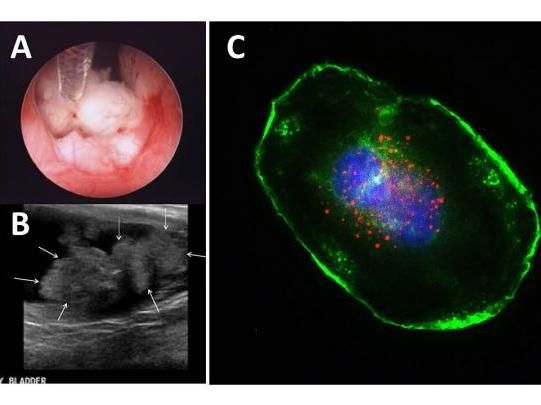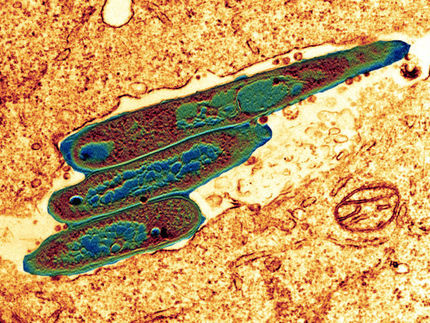Anthrax may be the next tool in the fight against bladder cancer
anthrax may soon help more people win the fight against bladder cancer, which the Centers for Disease Control and Prevention says strikes about 72,000 Americans each year and kills about 16,000, and is one of the most expensive cancers to treat.

Pet dogs suffering bladder cancer, for which all other approaches failed, were treated with a Purdue University experimental approach. A: Bladder cystoscopic biopsy being performed in patient dog to investigate tumor characteristics. B: Ultrasound image obtained to record tumor mass dimensions. Sagittal view of the bladder. Arrows point to mass in the neck of the bladder. C: Presence of Epidermal Growth Factor (EGF) Receptor on bladder cancer cells was revealed by binding and uptake of fluorescently labeled EGF (red). Nucleus (blue) and actin cytoskeleton (green) are also shown.
Purdue University/R. Claudio Aguilar
The current treatments for bladder cancer are invasive for patients - who often must sit for hours at a time with a bladder full of an agent designed to kill cancer cells and tumors. Bladder cancer also is one of the most reoccurring for people diagnosed with the disease.
Now, researchers at Purdue University have come up with a way to combine the anthrax toxin with a growth factor to kill bladder cancer cells and tumors. The research is published in the Oct. 4 edition of the International Journal of Cancer.
"We have effectively come up with a promising method to kill the cancer cells without harming the normal cells in the bladder," said R. Claudio Aguilar, an associate professor and the assistant head of biological sciences in Purdue's College of Science. "It is basically like creating a special solution that targets cancer cells while leaving healthy cells alone."
Aguilar said the bladder has its own protective layer, which saves the good cells from the anthrax mixture but offers no protection for the cancer cells and tumors. He said the Purdue system works within minutes - instead of the usual hours for bladder cancer treatment - to target the cancer cells in the bladder.
"We have seen outstanding results with our treatment," said Aguilar, who works as part of a team focused on cell identity and signaling at the Purdue University Center for Cancer Research. "It is fast and effective, both of which are critical for people dealing with this devastating disease."
Aguilar and his group worked with the Purdue teams led by Timothy Ratliff and Deborah Knapp to test their solution in dogs with bladder cancer who had run out of other treatment options. They found this new agent decreased the tumor size without causing any other side effects in the animals.
The Purdue team thinks a similar treatment may help people and animals with other cancers, including those affecting the lungs or skin.
Most read news
Other news from the department science

Get the life science industry in your inbox
By submitting this form you agree that LUMITOS AG will send you the newsletter(s) selected above by email. Your data will not be passed on to third parties. Your data will be stored and processed in accordance with our data protection regulations. LUMITOS may contact you by email for the purpose of advertising or market and opinion surveys. You can revoke your consent at any time without giving reasons to LUMITOS AG, Ernst-Augustin-Str. 2, 12489 Berlin, Germany or by e-mail at revoke@lumitos.com with effect for the future. In addition, each email contains a link to unsubscribe from the corresponding newsletter.






















































